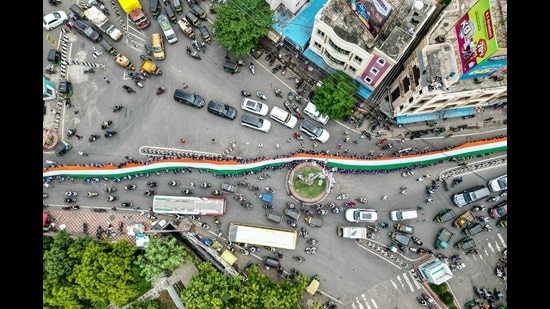Aug 14, 2024 09:14 PM IST
It is Muhammad Yunus’s wise mind, Saroj Devi’s generous soul and Arshad Nadeem’s pure heart that constitute true independence
I would be false to the ink of this column if I were to deny the plain truth that today, August 15, 2024, the country uppermost in mind is not India, which became free this day in 1947, but Bangladesh. I will be untrue to it if I were not to acknowledge that the leader who dominates my thought today is Sheikh Mujibur Rahman, the founder-leader and first president of Bangladesh, who was assassinated on this day in 1975.

And I would be dishonest to a columnist’s duty if I were to deny or downplay a third fact: On the day Mujib fell to a hail of bullets, Bangladesh was a four-year-young Republic. But India, a 25-year-old Republic, was under a national emergency then. Freedom can be lost to foreign powers, regained from them after bitter and heroic struggles, to be lost again to debilitated legatees of the original heroes and their retainers, to be reclaimed by the people yet again through irrepressible mass demonstrations of will and guts.
So, as India celebrates, as it must, its historic Independence Day today, it must do so not against the trapezes of mind-dumbing commemoration, but against the tapestry of historical truth and the trajectory of history’s bitter lessons. India and Pakistan were anointed on the night of August 14 and 15, 1947, in the attar of hope; they were baptised in the blood of hate.
The hates begrudged the hopes; they sought to rob them of their joy, their dreams. And, to use a pet phrase of Jawaharlal Nehru, succeeded ”in large measure”. The hates were seeded in what was called in undivided India, by senior and respected leaders who espoused it, the Two Nations Theory. The theory was that Hindus and Muslims were two separate people, two separate ‘nations’, and should be citizens of two separate nation-states. If some propagated this theory, there were those like Mahatma Gandhi, Pandit Jawaharlal Nehru, Sardar Vallabhbhai Patel, and Netaji Subhas Chandra Bose, born to Hindu parents, who believed Hindus and Muslims were meant to live together in amity, and those like Khan Abdul Ghaffar Khan, MA Ansari, Maulana Abul Kalam Azad and Kazi Nazrul Islam, born to Muslim parents, who did so too, vociferously.
In the momentum for freedom, hope lost out to hate, and two nations emerged in place of one, until 1971, when humanity resuscitated hope in the eastern half of Pakistan as it revolted against division on the basis of religion. Indira Gandhi — be it said to the credit of that daughter of freedom and of freedom’s great fighter — saw that the India that had rejected Two Nations must help East Pakistan become itself again, in freedom, as one nation for all its nationalities. And Bangladesh was born.
India, Mother India, got its freedom from British rule in 1947. As did East Bengal which became in 1947 East Pakistan, until it got freedom a second time in 1971, with India standing beside it in courageous solidarity.
Today, we celebrate this three-in-one freedom — 1947 for India and 1947 plus 1971 for Bangladesh.
But we must do more. In all honesty, freedoms can be lost to one’s own kind. History tells us that though genes, by definition, are inherited, they can mutate and debase themselves. And can scurry towards the examples of history’s power-greedy, turf-thirsty, egos. Politics, as a means of service, is ever challenged by politics as a means of control.
When, therefore, an octogenarian deviser of rural credit is suddenly asked to devise ways of restoring political credit to Bangladesh’s shattered polity and frenzied society, and he says Bangladesh is now liberating itself a third time, all freedom-lovers across the world take note.
And as I salute the freedom fighters of 1947 and 1971, I do so too for those who have brought freedom to Bangladesh from its internal un-freedom. But, and this is no ordinary ‘but’, as in 1947 and 1971, this third freedom too has been sullied by hate. I find it unbearable that crazed mobs should vandalise the statue of Bangabandhu Mujib and the work of art showing the surrender of Pakistan’s military to India’s military chiefs in liberated Bangladesh. This vandalism recalls the hate behind the Two Nations Theory seeking to smother hope. But even more, I find it intolerable that mobs masquerading as patriots should attack Hindus, their homes and temples.
Salutations, therefore, to Chief Adviser Muhammad Yunus for saying in no uncertain terms that the attacks on Hindus in the wake of Sheikh Hasina’s exit are “heinous” and that they have made him feel “ashamed”. He has asked, “Are the Hindus, Christians, and those of religions other than Islam in our country not Bangladeshis?” In a move that fills me with hope, he said exactly what Gandhi said in East Bengal’s Noakhali in 1946 as its Hindus felt the ‘Two Nations’ whip. Gandhi asked the Muslims of Noakhali to make the safety of Hindus their concern. Yunus has done the same, and hundreds of protesters have hearkened to his call.
I must conclude with a thought about Pakistan. When our very own Neeraj Chopra’s javelin throw was bettered in the Paris Olympics by that of Pakistan’s Arshad Nadeem, Neeraj’s mother — Saroj Devi — when asked about Nadeem, said that he is also like a son to her. Nadeem, responding, said that he was grateful that she prayed for him as well and said that she is like a mother to him.
This spirit is what will save the freedoms of our three countries from being abducted by suspicion and forced into baptisms of blood. It is Yunus’s wise mind, Saroj Devi’s generous soul and Nadeem’s pure heart that constitutes for me all that true independence means.
Gopalkrishna Gandhi, a former administrator, is a student of modern Indian history. The views expressed are personal
Story Saved


